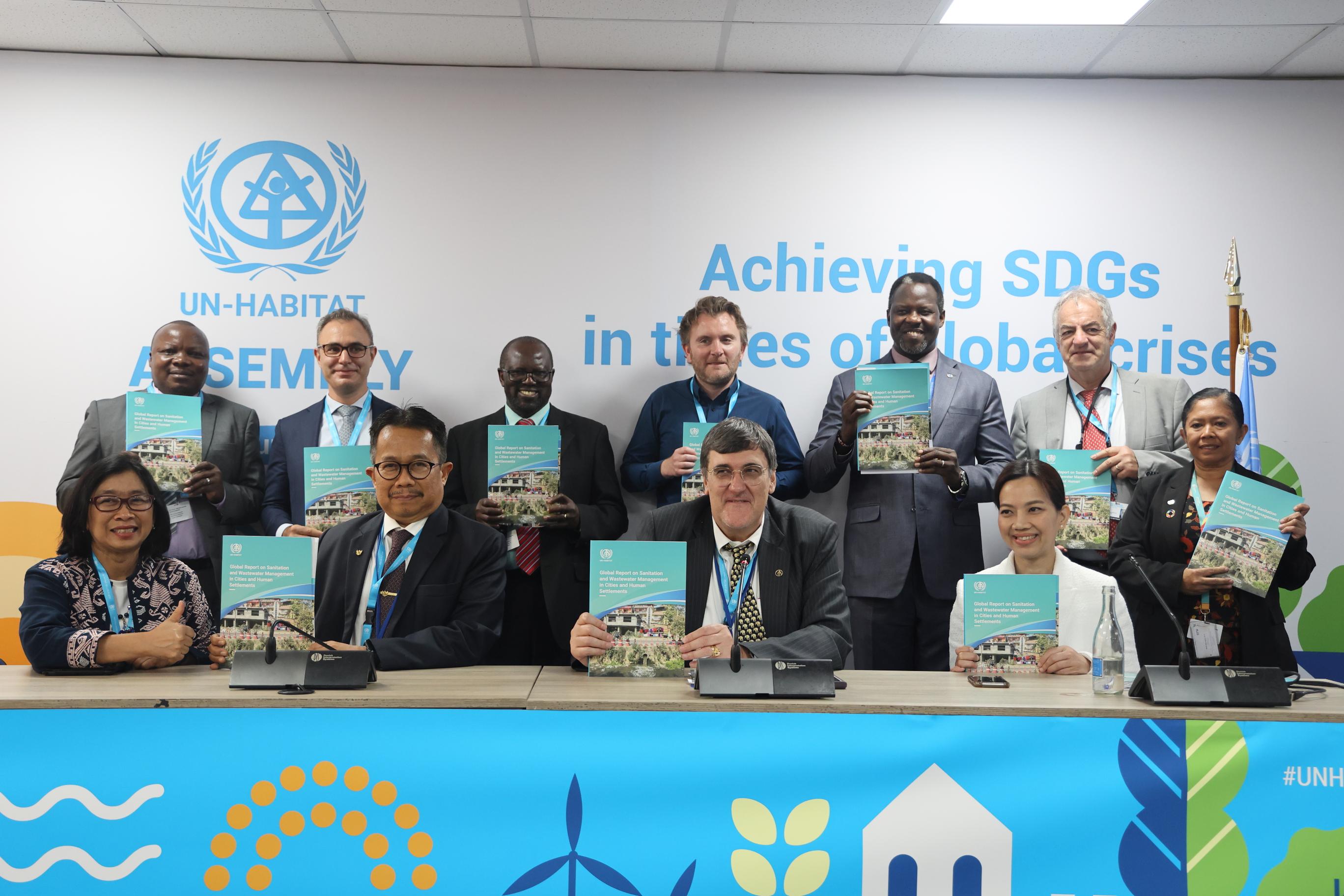Progress report for
Global report on Sanitation and Wastewater Management in cities and human settlements

Achievement at a glance
The United Nations Human Settlements Programme’s Global Report on Sanitation and Wastewater Management in Cities and Human Settlements was launched at the Second UN-Habitat Assembly held in Nairobi, Kenya, in June 2023. In a statement delivered by the Under Secretary-General and Executive Director of UN-Habitat, Ms. Maimunah Mohd Sharif, she noted: “We can develop more sustainable and resilient cities and communities by taking a more comprehensive approach to sanitation and wastewater management while encouraging environmental sustainability and preserving public health”.Speaking through a video message, Mr. Brian Arbogast, Director Water, Sanitation and Hygiene at the Bill & Melinda Gates Foundation observed: “Sanitation is a public good. Besides data management, the coordination across the responsible ministries and partners of implementation is among the key factors driving progressive sanitation services. I am confident that strong public services with accountability and resource will drive technology and financial viability delivery services even with major challenges of rapid growth, climate change and regional instability”.
Sanitation and wastewater management remains a huge challenge for many cities and human settlements. 3.6 billion people still lack safely managed sanitation services and up to 494 million people practise open defecation. In addition, over 80% of the world’s sewage is discharged untreated into the environment.
The impact of poor sanitation and wastewater management on health, livelihoods and environment is huge. Unsanitary conditions in slums and informal settlements, which currently accommodate over 1 billion people, create a constant threat of disease outbreaks, such as cholera. Untreated wastewater and faecal sludge often enter freshwater bodies, deteriorating water quality and threatening the aquatic ecosystem.
The Report serves as a global reference on sanitation and wastewater in urban settings. It takes stock of the sanitation and wastewater management situation, both in terms of service levels and the supporting functions required to enable service provision at scale. Drawing from existing literature and primary data in 18 cities across Africa, Asia, Europe and Latin America, the Report underlines the scale of the challenge in strengthening wastewater and faecal sludge management at the global level, while also highlighting actions being taken by governments, development partners, city planners, utilities, service providers and researchers around the globe. Focus is on service levels, containment and treatment systems, treatment performance, policies and regulations and institutional arrangement, planning and investment, monitoring, and financial performance.
It showcases detailed case studies in 5 of the 18 focus cities, providing an overview of key elements of wastewater and faecal sludge management and how authorities are proactively engaging with different thematic areas supporting the three core functions of Citywide Inclusive Sanitation (CWIS) of: resource planning and management, responsibilities and accountability, including city and national level sanitation data management systems, climate resilience and emerging innovations.
The report was prepared by a consortium led by Water & Sanitation for the Urban Poor (WSUP) and supported by the Bill & Melinda Gates Foundation and Agence Française de Développement.
Challenges faced in implementation
Lack of reliable data in 2 out of the 20 cities marked for the study resulted in a reduction in the number of cities to 18.Next Steps
Develop a masterclass with chapter specific lessons alongside 5 webinars to support dissemination and use of the Global Report on Sanitation and Wastewater Management on Cities and Human Settlements by staff from public institutions, national staff training institutions, academic institutions and urban planning and sanitation and wastewater practitioners.The Global Report on Sanitation and Wastewater Management in Cities and Human Settlements, launched during the 2nd Session of the UN-Habitat Assembly in Nairobi is a deliverable of Outcome 1 of the first grant. The report has been applauded as one significant step towards raising the sanitation services profile for global, regional, national, and even local actions. To enhance learning and city level reflections on the report, there will be need to widely disseminate the report to encourage and facilitate open dialogue among the sector stakeholders including decision makers and practitioners in countries and cities starting from a low base point in sanitation and wastewater management to understand better the priority actions towards city sanitation services improvement the strong linkage with the urban planning and development. Realizing the importance of dissemination, there is need to focus on reaching different regional and national professional associations of public officials and employees, drawn from the regulators, utilities, and municipalities with the details of the report. This will be achieved through a webinar series to be co-hosted with regional associations bringing together, panellists from the association and external public sector professionals from other region to discuss the report chapters and their implications for the cities. Various targeted strategies for the dissemination of the report will be adopted to reach the intended stakeholders in collaboration with WSUP-the lead authors.
Beneficiaries
Beneficiaries include staff from public institutions, national staff training institutions, policy makers, academic institutions and urban planning and sanitation and wastewater practitioners. policy
